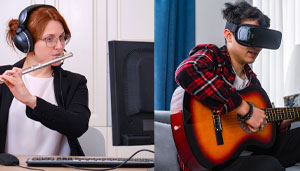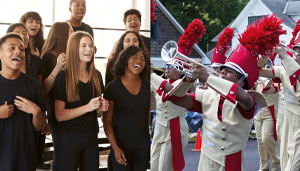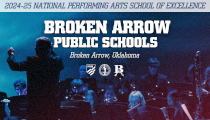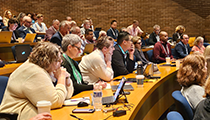Refreshed and Renewed: Protecting Your Passion for Teaching in the Music Classroom
By Dr. Derrick Fox on December 12, 2022 advocacy PrintAs we return from a summer of rejuvenation and preparation for a new academic year, I am reminded of how invigorating the art of music can be for the soul. Searching through many scores, listening to inspirational concerts and perusing the past programs of our colleagues reminds us of why we fell in love with music and developed a passion for music education. We are driven by this passion to pay the gift of music forward to our students.
As the years go by, we assume many roles as director, choreographer, set builder, costume designer, caregiver, counselor, etc…. losing ourselves in the many tasks that are required to keep our music programs afloat. Over my years of teaching, these demands begin to chip away at the passion for music that we once coveted. In an effort to protect my own passion and develop a healthier work/life balance, I devised strategies that allowed me to truly enjoy teaching by fostering classroom community, instilling student ownership and rekindling my own personal music making endeavors.
Pace/Play: It is important that you don’t take yourself too seriously. Students appreciate rehearsals that offer a balance of challenge and relaxation. Finding that intricate balance will yield a great amount of student equity for when you really need every ounce of their attention.
Acquire: Never stop learning! If you can’t make it to your state or national convention, create your own cohort of teachers with whom you can trade ideas and best practices. With Zoom, Face Time and other social outreach applications, it is easier than ever to build professional groups that reflect the needs of your teaching situation. No teacher must be an island unto themselves.
Sing (Perform): We know that singing/performing is a VERY personal act. If you would like for your students to be vulnerable then you must be too. Choral directors should stay engaged vocally so that we never forget what it feels like to be one the other side of the podium. Band/orchestra directors should play their instruments for their student as well. We often sing or play our students parts for them but how often do we perform for them? Implementing this strategy into your classroom will inform the way you teach your own musicians when you remember what it feels like to be the singer/player in an ensemble.
Savor: Savor the success! As music students, we are taught to find and the errors and move on to the next issue that is standing in the way of a performance. If you get wrapped up in the hunt for mistakes, your students will never experience the gratification of achieving. Take time to intentionally revel in the good things, however big or small, because you and your students deserve it.
Imagine: It is imperative that you have a vision for your work. A music program without a mission is like a house built without a blueprint. No one will want to live there. I encourage you to create a mission statement for your music program. The motto we used for my high school was “Great Music, Better People.” My teaching strategies, literature choices and interactions with my students exemplified that statement so that I could ask the same of them. Be creative in your presentation of music in concerts and class.
Ownership: Find ways to relinquish some aspect of your classroom, rehearsal or choral program, concert to your students (i.e. roll taking, uniform check-out, leading sight reading). For this of us who identify as Type A educators, this is difficult because we are doers and find it hard to “just let go”. Students will take care of possessions in which they have invested their own time.
Never forget your purpose: Have you clearly defined why students should be a part of YOUR program? We are all familiar with commonly shared benefits of participating in music programs, but can you articulate how those benefits are applicable to your program? Be proactive about specifying how your band/choir/orchestra/music program is directly related to the overall well-being of the school community. This will come in handy if you find yourself in the unfortunate position of justifying your program needs.
Appreciate: In the hustle and bustle of preparing concerts, shows, solo and ensemble groups, we can forget to express our gratitude to our students, colleagues, family and friends. “Let us be grateful to the people who make us happy; they are the charming gardeners who make our souls blossom.” – Marcel Proust
Trust: Build relationships with those whom you trust with your professional well-being. There are those who will point out your flaws because it makes THEM feel better and there are others who will point out your flaws because they are truly invested in YOUR growth. Discovering the difference can lead to a wonderful cohort of lifelong friendships and musical inspiration.
Empower: Music can be a vehicle for understanding cultural differences and build bridges between your students. Choose literature that represents the diverse cultures that compromise your classrooms, schools, district, state and country. Not only does this empower the students in your classroom who see themselves acknowledged/celebrated in the works you perform but it also builds a positive learning community in which you can accomplish great music making. This is the core of what we want to achieve every day in our music learning spaces.
As you move through your year checking things from your “to-do-list,” I encourage you to keep the quality of the music learning experiences you are building at the forefront of your actions. We are all familiar with the quote, “Choose a job you love, and you will never have to work a day in your life.” I’d like to expound upon that with “Choose a job you’re P.A.S.S.I.O.N.A.T.E. about, and you’ll love it every day of your life.”
Dr. Derrick Fox
This article first appeared in NMEA’s Nebraska Music Educators Magazine, July 2019 edition. The Nebraska Music Education Association is committed to building a robust statewide community of qualified music educators and allies by cultivating genuine relationships, advancing music education, and advocating for the profession. Check out the Nebraska Music Educators Association here: (https://www.nmeanebraska.org/)
Most Recent Articles







